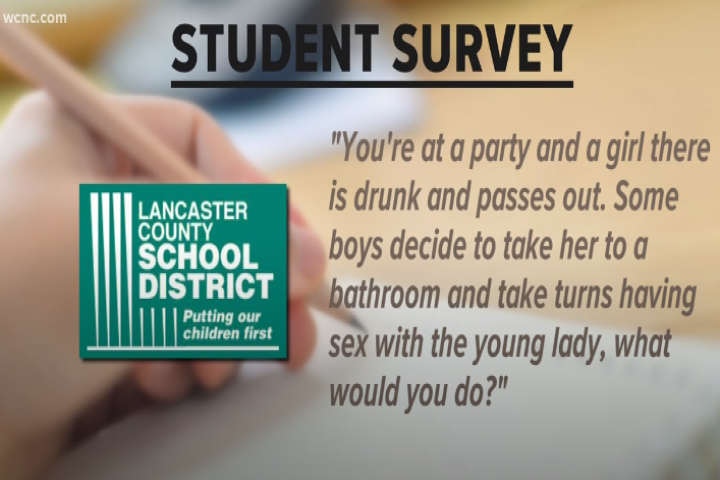Efforts in a South Carolina school to broach sexual assault and other sensitive subjects with students is meeting resistance from some parents who believe the discussions are better left at home.


Efforts in a South Carolina school to broach sexual assault and other sensitive subjects with students is meeting resistance from some parents who believe the discussions are better left at home.
Jennifer McAteer, mother of a Lancaster High School student, told WCNC she was disappointed when her son texted her about a school sex survey he was asked to complete in class last week.
“You know, if they want to do a survey, that’s fine do a survey, do it online with your mom and dad, mail it, whatever, but this isn’t something to go in the classroom and be presented with before parents know and before we can talk about it with our minor children,” she said.
“I hope that this does not start the conversation, which it has,” McAteer said. “I think this should be talked about with me and my children, not through children and my children. This should be talked about at home.”
Paul McKenzie, the district’s veteran research director, told the news site he crafted the survey as part of a broader effort to gauge teen perceptions of bullying, violence and sexual assault ahead of a new program called “Engaging Men and Boys.”
The survey includes questions such as: “You’re at a party and a girl there is drunk and passes out. Some boys decide to take her to a bedroom and take turns having sex with the young lady, what would you do?”
“It’s an effort to get young men that when bad things happen, they stand up and take a stance,” McKenzie said. “And so that’s what that question was, ‘What would you do? Would you call the police? Would You call a parent? Would you not know what to do at all?’”
“Engaging Men and Boys” is an elective course at the school run by the group “Palmetto Citizens Against Sexual Assault” using a curriculum developed in coordination with a local church. The class is designed to include church leaders, police and other community leaders to help serve as role models for students who don’t have a strong male influence at home.
The survey, McKenzie said, serves as a baseline for progress.
“The data that we collect is not only to identify problems but also to help us generate solutions and monitor to see if they’re working or not,” he said.
A year-long Associated Press investigation published last year uncovered roughly 17,000 reports of sex assaults by K-12 students between 2011 and 2015.
Researchers with the Institute for Advanced Studies in Culture at the University of Virginia noted that some public high school teachers’ are reluctant to engage students in controversial issues like sexual assault and that this has potential to undermines character education.
They observed “this failure to provide a fully developed and broadly coherent moral message was partly due to public school teachers’ reluctance to opine on controversial issues,” Institute founder James Davison Hunter wrote in “The Content of Their Character,” a summary of character education in a wide variety of schools.
The situation means many often refrain from “providing serious direction on what is right and what is wrong,” Hunter wrote.
A 2010 study from the University of Newcastle takes a deeper look at “Teaching about, and dealing with, sensitive issues in schools,” particularly from the perspective of pre-service teachers.
“Teachers are developing an increasingly active role in the education of students in areas of sensitivity, including issues such as sexuality, mental health, grief and loss and child protection. There is a growing expectation for teachers to become competent not only in educating students in these areas but also in recognizing and dealing with such matters if and when they arise in the classroom,” according to the study.
“However, a large proportion of teachers express discomfort in these areas, resulting in negative outcomes for both teachers and students.”